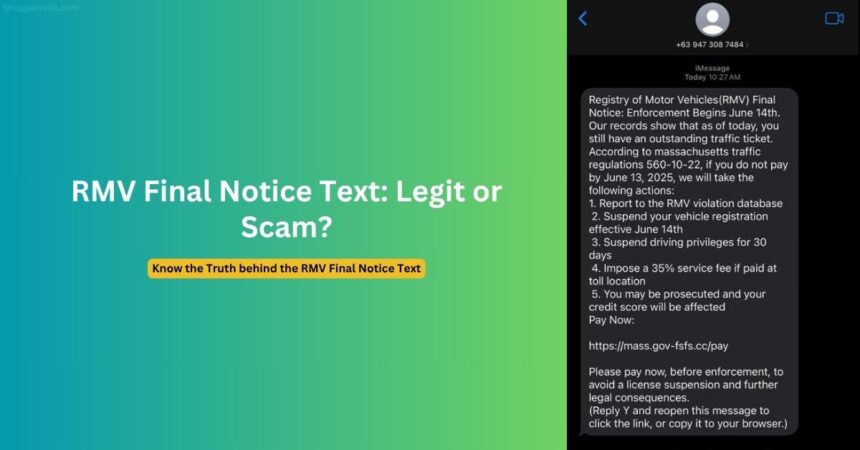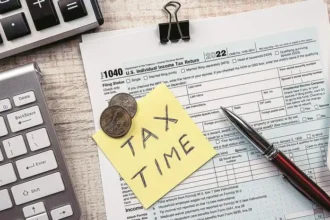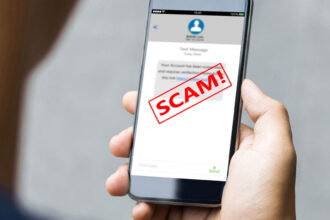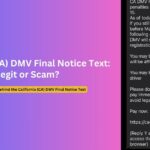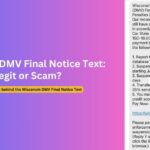Massachusetts residents are being targeted by a sophisticated text message scam claiming to be from the Registry of Motor Vehicles (RMV). These fraudulent “final notice” texts threaten license suspension and legal action over fake outstanding traffic tickets, tricking victims into paying nonexistent fines through malicious websites.
The Massachusetts RMV and local police departments across the state have issued urgent warnings after thousands of residents reported receiving identical scam texts demanding immediate payment to avoid severe consequences. This comprehensive guide will help you identify, avoid, and report these dangerous RMV Final Notice Text Scams.
Overview of the RMV Final Notice Text Scam
The RMV Final Notice Text Scam represents a coordinated “smishing” (SMS phishing) campaign targeting drivers across Massachusetts and multiple other states. Scammers are impersonating the Massachusetts Registry of Motor Vehicles to trick victims into believing they have outstanding traffic violations that require immediate payment.
These sophisticated scams exploit people’s fear of losing their driving privileges and damaging their credit scores. The fraudulent messages create false urgency by claiming enforcement actions will begin within 24-48 hours, pressuring recipients to act quickly without verifying the legitimacy of the claims.
According to Massachusetts RMV Registrar Colleen Ogilvie, “The RMV will never text you looking for payment. Scammers will often convey urgency to manipulate you.” The agency emphasizes that all legitimate RMV communications occur through official channels, primarily mail and the official Mass.Gov/RMV website.
The scam has been particularly effective because the messages appear credible, referencing specific dates, fake regulations, and official-sounding language. However, several red flags make these texts identifiable as fraudulent attempts to steal personal and financial information.
How the RMV Traffic Tickets Text Scam Works
The Registry of Motor Vehicles outstanding traffic ticket text scam follows a predictable pattern designed to maximize victim compliance through fear and urgency. Understanding this process is crucial for protection against these fraudulent schemes.
Initial Contact Phase Scammers send mass text messages to phone numbers, often targeting specific geographic areas. The messages appear to come from official sources, sometimes using spoofed numbers or email addresses to enhance credibility. Recipients receive texts claiming to be “final notices” about outstanding traffic violations.
Pressure and Urgency Tactics The fake RMV Final Reminder Text creates immediate pressure by setting tight deadlines, typically 24-48 hours before alleged enforcement actions begin. This artificial urgency prevents victims from taking time to verify the claims or consult with others who might recognize the scam.
False Authority and Consequences Scammers reference nonexistent regulations, such as “massachusetts traffic regulations 560-10-22,” to add legitimacy to their claims. They threaten severe consequences including license suspension, vehicle registration revocation, credit score damage, and legal prosecution to motivate immediate compliance.
Payment Collection Victims who click the malicious links are directed to fake websites designed to steal credit card information, bank account details, and personal data. These sites often mimic official government portals, making them appear legitimate to unsuspecting users.
Data Harvesting Beyond immediate financial theft, scammers collect personal information that can be used for identity theft, sold to other criminals, or used in future scam attempts. This makes victims vulnerable to ongoing fraud even after the initial incident.
Fake Text Message Patterns and Examples
The RMV Final Notice Text Scam follows specific patterns that help identify fraudulent messages. Here are common examples and variations currently circulating:
Standard Scam Text Format:
Registry of Motor Vehicles (RMV) Final Notice: Enforcement Begins June 14th. Our records show that as of today, you still have an outstanding traffic ticket. According to massachusetts traffic regulations 560-10-22, if you do not pay by June 13, 2025, we will take the following actions:
1. Report to the RMV violation database
2. Suspend your vehicle registration effective June 14th
3. Suspend driving privileges for 30 days
4. Impose a 35% service fee if paid at toll location
5. You may be prosecuted and your credit score will be affected
Pay Now: https://mass.gov-fsfs.cc/pay
Please pay now, before enforcement, to avoid a license suspension and further legal consequences.
(Reply Y and reopen this message to click the link, or copy it to your browser.)
Common Variations and Adaptations
Shortened Urgent Format: “URGENT: MA RMV FINAL NOTICE – Outstanding violation: $125 – License suspension begins TOMORROW – Pay immediately: [fraudulent URL] – Failure to pay will result in arrest warrant”
Multi-State Adaptation: “DMV FINAL ENFORCEMENT NOTICE – Your TX driver’s license will be suspended in 24 hours due to unpaid citation #TX-4847291 – Amount due: $85 + late fees – Pay now: [fake website]”
Email-Style Professional Format: “Massachusetts Registry of Motor Vehicles RE: FINAL ENFORCEMENT NOTICE Case #: RMV-2025-447821 – Amount Due: $85.00 + $45.00 late fee = $130.00 – DEADLINE: June 14, 2025 11:59 PM”
Message Pattern Analysis
All variations share common elements that help identify them as fraudulent:
- Fake urgency with unrealistic 24-48 hour deadlines
- References to nonexistent regulations or case numbers
- Multiple severe consequences listed together
- Suspicious URLs that don’t match official .gov domains
- Requests for immediate online payment
- Grammar errors or formatting inconsistencies
Variations in Scam Messages:
- Different deadline dates (always 24-48 hours from message receipt)
- Varying fine amounts ($85-$300 commonly cited)
- Different fake regulation numbers
- Alternative fraudulent website URLs
- Modified consequence lists
- Different sender names or numbers
Common Sender Characteristics:
- International phone numbers (particularly +63 Philippines area codes)
- Email addresses instead of phone numbers
- Random personal names as senders
- Inconsistent formatting and grammar errors
Critical Red Flags to Identify Fraudulent RMV Texts
Recognizing these warning signs can prevent you from falling victim to the RMV Final Notice Text Scam:
Communication Method Red Flags:
- Unsolicited text messages claiming to be from RMV
- Messages demanding immediate payment via text
- Communications from unknown or suspicious phone numbers
- Texts containing grammatical errors or formatting inconsistencies
Content-Based Warning Signs:
- References to nonexistent regulations (like “massachusetts traffic regulations 560-10-22”)
- Extremely tight deadlines (24-48 hours)
- Threats of multiple severe consequences
- Requests for immediate online payment
- URLs that don’t match the official Mass.Gov domain
Technical Red Flags:
- Links to websites not ending in .gov
- Suspicious URLs with extra characters or subdomains
- Requests to “reply Y” or interact with the message
- Instructions to copy links to browsers manually
- Poor website design or security warnings when visiting links
Behavioral Red Flags:
- Creating false urgency and panic
- Threatening credit score damage
- Claiming immediate legal action
- Requesting personal information via text
- Demanding payment through unusual methods
How to Identify and Protect Yourself from These Scams
Protecting yourself from the RMV Final Notice Text Scam requires awareness, verification, and proper security practices. Follow these comprehensive protection strategies:
Verification Steps:
- Never click links in suspicious texts – Always visit official websites directly
- Contact RMV directly – Call (857) 368-8000 or visit Mass.Gov/RMV
- Check your driving record – Log into your official RMV account
- Verify with local police – Many departments are tracking these scams
- Cross-reference information – Real violations appear in official records
Technical Protection Measures:
- Enable spam filtering on your phone
- Use two-factor authentication on official accounts
- Keep personal information private on social media
- Regularly monitor credit reports and bank statements
- Install reputable antivirus software on devices
Educational Awareness:
- Stay informed about current scam trends
- Share warnings with family and friends
- Follow official RMV social media accounts for updates
- Subscribe to fraud alerts from government agencies
- Participate in community awareness programs
What to Do If You Receive a Fake RMV Text
If you receive a suspected RMV Traffic Tickets text scam, follow these immediate action steps:
Immediate Response Protocol
- Do NOT click any links in the message
- Do NOT reply to the text message
- Do NOT provide any personal or financial information
- Take a screenshot for evidence and reporting purposes
- Block the sender immediately through your phone settings
Reporting and Documentation Steps
Federal Reporting:
- Report to the Federal Trade Commission at ReportFraud.ftc.gov
- Forward the message to 7726 (SPAM) for carrier investigation
- File a complaint with the Internet Crime Complaint Center (IC3.gov)
State and Local Reporting:
- Contact Massachusetts RMV at (857) 368-8000
- File a report with local police department
- Contact your state attorney general’s consumer protection division
If You Already Responded to the Scam
Immediate Financial Protection:
- Contact your bank or credit card company immediately
- Change passwords on all financial and government accounts
- Monitor credit reports for suspicious activity
- Consider placing a fraud alert on your credit file
- Document all communications and transactions
Long-term Recovery Steps:
- File a police report for identity theft if personal information was provided
- Consider identity monitoring services
- Review and dispute any unauthorized charges
- Work with financial institutions to secure compromised accounts
Nationwide Scam Campaign Targeting Major Cities
The RMV Final Reminder Text scam has expanded beyond Massachusetts, targeting residents across major metropolitan areas and states nationwide. This coordinated criminal campaign affects both urban centers and rural communities.
Major States and Cities Under Attack
Northeast Region:
- New York: New York City, Buffalo, Rochester, Syracuse, Albany
- Pennsylvania: Philadelphia, Pittsburgh, Allentown, Erie, Harrisburg
- New Jersey: Newark, Jersey City, Paterson, Elizabeth, Trenton
- Connecticut: Bridgeport, Hartford, New Haven, Stamford, Waterbury
Southeast Region:
- Florida: Jacksonville, Miami, Tampa, Orlando, Fort Lauderdale
- Georgia: Atlanta, Columbus, Augusta, Savannah, Athens
- North Carolina: Charlotte, Raleigh, Greensboro, Durham, Winston-Salem
- Virginia: Virginia Beach, Norfolk, Richmond, Chesapeake, Newport News
Midwest Region:
- Illinois: Chicago, Aurora, Rockford, Joliet, Springfield
- Ohio: Columbus, Cleveland, Cincinnati, Toledo, Akron
- Michigan: Detroit, Grand Rapids, Warren, Sterling Heights, Lansing
- Texas: Houston, San Antonio, Dallas, Austin, Fort Worth
Western Region:
- California: Los Angeles, San Diego, San Jose, San Francisco, Fresno
- Arizona: Phoenix, Tucson, Mesa, Chandler, Glendale
- Colorado: Denver, Colorado Springs, Aurora, Fort Collins, Lakewood
- Washington: Seattle, Spokane, Tacoma, Vancouver, Bellevue
This widespread targeting demonstrates the sophisticated nature of the criminal operation, with scammers adapting messages to reference local motor vehicle agencies (DMV, DOT, RMV) and jurisdictions across different states.
Frequently Asked Questions (FAQs)
1. Is RMV Final Notice or Outstanding Traffic Ticket Text Legit?
No, these text messages are completely fraudulent. The Massachusetts Registry of Motor Vehicles does not send unsolicited text messages demanding payment or threatening enforcement actions. Any text claiming to be from the RMV about outstanding tickets, final notices, or urgent payment requirements is a scam designed to steal your personal and financial information.
The RMV only sends text notifications in response to customer-initiated requests or transactions, such as appointment confirmations or service updates that you specifically requested through their official website or phone system.
2. What is Massachusetts Traffic Regulations 560-10-22?
This regulation number is completely fabricated and does not exist. Scammers created this fake regulation reference to make their fraudulent messages appear official and legitimate. Massachusetts traffic laws and regulations follow different numbering systems and are properly codified in the Massachusetts General Laws, not the fake numbering system used in these scam messages.
Real Massachusetts traffic violations are governed by established statutes that are publicly available through official government websites. The fake regulation “560-10-22” is a clear red flag that immediately identifies these messages as scams.
3. Is RMV Mass Ticket Payment Through Text Links Safe?
Absolutely not. Legitimate RMV payments can only be made through the official Mass.Gov/RMV website or in-person at authorized RMV locations. Any payment links sent via text message are fraudulent and designed to steal your credit card information, bank account details, and personal data.
The official RMV payment portal requires you to log into your verified account on the legitimate government website. Real government agencies never request immediate payment through text message links, especially with threats of immediate consequences.
4. Does RMV Send Text Messages?
The RMV only sends text messages for customer-initiated services. These legitimate texts are strictly limited to:
- Appointment confirmations that you specifically requested
- Service updates for transactions you initiated through official channels
- Renewal reminders for services you opted into receiving
- Road test confirmations and scheduling updates
The RMV never sends unsolicited texts about violations, payments, or enforcement actions. They do not text about outstanding tickets, final notices, or threats of license suspension. All legitimate RMV communications about violations and legal matters are sent through official mail channels with proper documentation.
5. What Should I Do If I Already Clicked the Link or Provided Information?
Take immediate action to protect yourself:
Financial Protection:
- Contact your bank and credit card companies immediately to report potential fraud
- Change passwords on all financial accounts and government service accounts
- Monitor your credit reports closely for suspicious activity
- Consider placing a fraud alert or credit freeze on your credit file
Documentation and Reporting:
- File a police report if you provided personal information to the scammers
- Report the incident to the Federal Trade Commission at ReportFraud.ftc.gov
- Document everything including screenshots, transaction records, and all communications
- Contact the legitimate RMV to report the fraudulent use of their name
Time is critical in fraud cases, so act quickly to minimize potential damage. Many banks and credit card companies have zero-liability policies for fraud, but you must report incidents promptly to receive full protection.
Conclusion
The RMV Final Notice Text Scam represents a serious and growing threat to drivers across Massachusetts and nationwide. These sophisticated “smishing” attacks exploit people’s natural concerns about maintaining valid driving privileges and avoiding legal troubles to steal personal and financial information.
Key Protection Points to Remember:
- The RMV will never text you demanding immediate payment or threatening urgent enforcement actions
- All legitimate RMV communications about violations come through official mail with proper documentation
- Always verify unexpected government communications through official channels before taking any action
- Use only Mass.Gov/RMV for legitimate RMV services and transactions
- Report suspicious messages immediately to help protect others in your community
Essential Action Steps:
- Never click links in unexpected government text messages
- Always contact the RMV directly at (857) 368-8000 to verify any claims
- Share this information with family and friends to create community awareness
- Report fraudulent messages to appropriate authorities
- Stay informed about evolving scam tactics and protection strategies
By staying vigilant, verifying communications through official channels, and sharing awareness with others, we can collectively protect our communities from these increasingly sophisticated fraud attempts. Remember that legitimate government agencies have established procedures and timelines that don’t require immediate panic responses to text messages.
The fight against the Registry of Motor Vehicles outstanding traffic ticket text scam requires community-wide awareness and individual responsibility to verify before acting on any unexpected official communications.
Stay informed with the latest scam alerts, consumer protection tips, and fraud prevention strategies at ShoppersVila.com – your trusted source for comprehensive consumer safety information and community protection resources.
